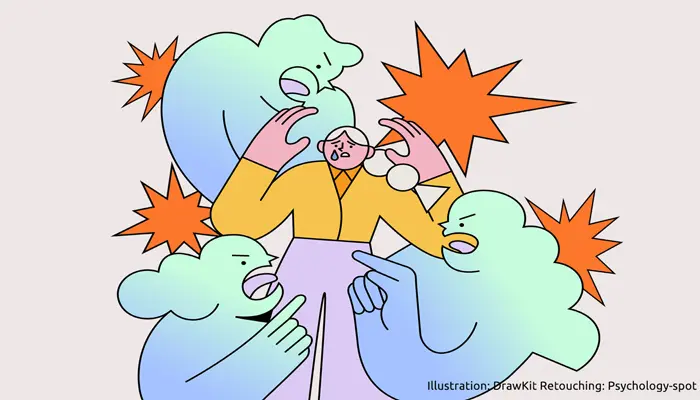
In one way or another, we all let ourselves be influenced by the opinions of the others. The social approval is important and we often use it as a compass that helps us determine whether we are on the right track or not.
But when we worry too much about what others think, we fall into the mistake of living through their opinions and making decisions based on acceptance or rejection, rather than letting us be guided by our desires and needs. Therefore, it is important to be alert to the signs that we have begun to worry too much about what others think.
How do you recognize the dependence on people’s opinions?
1. You say lies or contradict yourself. If you change your mind just to try to get involved in the group, you probably worry too much about what others think and you believe they will not accept your opinions and ideas. If you find that you often think, pretend and change your mind, you are probably looking for social acceptance.
2. You are afraid to say ‘no’. Say ‘no’ is a right, you have the right to refuse when you think someone is overcoming the limits or simply you do not like something. If you often say ‘yes’ when you want to say ‘no’, it is likely that you are letting yourself be too much conditioned from the others. In fact, as little children we’re taught to be compliant, but saying ‘no’ does not hurt anyone, it’s just a right.
3. You say “I’m sorry” even if it is not your fault. If you often find yourself apologizing for things on what you have no responsibility or control, you are probably taking a blame that does not belong to you. Apologizing is a sign of intelligence and empathy, but only when we really made a mistake and regretted it.
4. You judge yourself through the eyes of the others. If every time you do something you wonder what others will think, you probably have a problem of self-esteem. If the comments of the others are always present in your mind, to tell you what you have to do or not, it will be virtually impossible for you to know what you really want.
5. You change your plans to please the others. If you consistently abandon your plans and cede in the face of others, it is likely that within you hide the fear of rejection and social exclusion. It is important to find a balance, because continually place the needs of others before yours will force you to relegate to a second level and you will choose a life that you do not like.
6. Your emotional states fluctuate based on the feedback you receive. It is normal that when others praise us we feel happy, but if you live on an emotional roller coaster that depends on the judgment of the others you have a problem. It is important that you learn not to take the comments or criticism of the others as something too personal.
7. You care to say the right thing at the right time. You worry too much about “tone drops” so that you often self-censor, so you almost never share your ideas and opinions, for fear that the others might disagree or that you might offend someone.
8. You try to please everyone. With some people we immediately get in touch, with others not. It is impossible to please everyone, so the desire to make a good impression and please everyone is just illusory and only serves to add unnecessary stress to your life. In fact, doing so, you are at risk of turning yourself into a social chameleon, which means you will lose your identity.
9. You are obsessed with what others think. Worrying about what others think is different from asking for approval. We all participate in this “mental game”, but if you get to the point of being obsessed with what others think of you, you will have a big problem.
10. You have difficulty making decisions, even the smallest ones. Indecision is characteristic of people who are not sufficiently certain of themselves, so they try to compensate it with perfectionism. In this way, the fear of mistake can lead to a real decision paralysis. You constantly think about everything that might go wrong and you can’t decide.
If you are one of those people who are very concerned about the opinions of the others or recentely you have found that you are more dependent on the judgment of others, here you will find why we are concerned about what the others are thinking.



